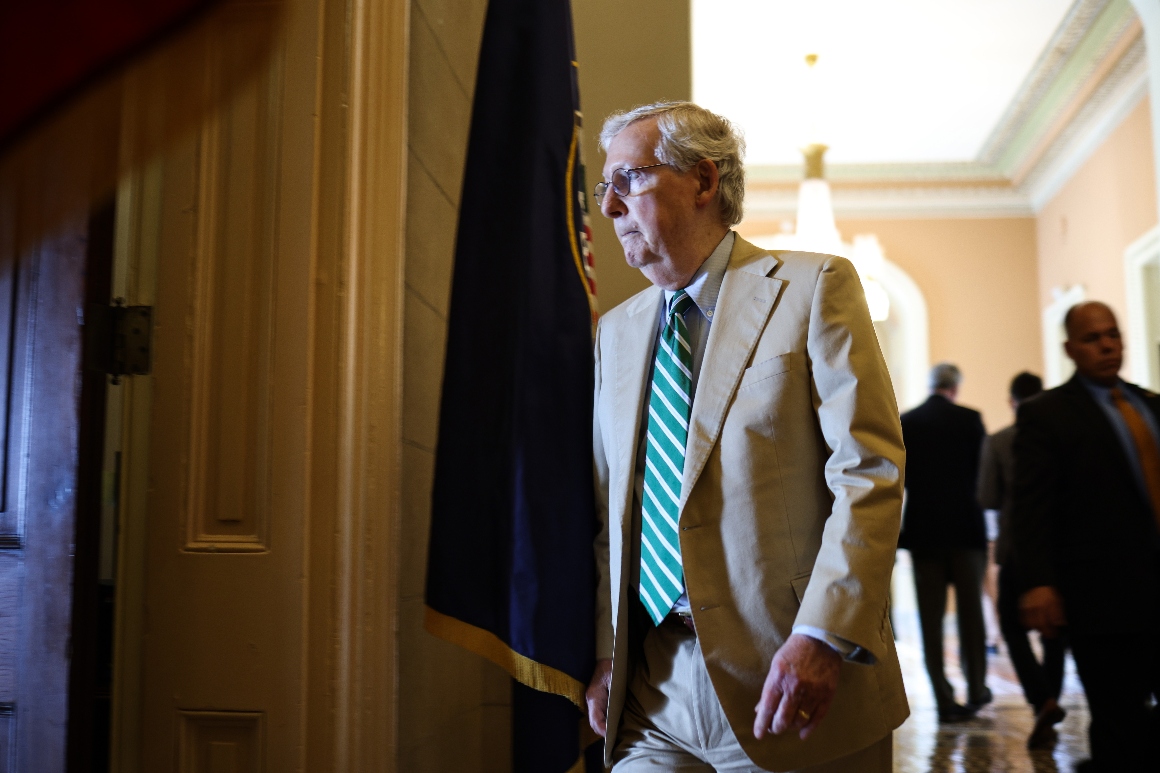The United States runs out of power to keep borrowing money in 10 days. If Congress doesn’t act fast to handle the debt limit in the weeks that follow, Democrats say the fallout will be Mitch McConnell’s fault.
Top Senate Democrats accused the minority leader Wednesday of plotting to hold the economy hostage after McConnell said he doesn’t expect any Republican senators to vote to prevent the U.S. government from defaulting on its loans in the coming weeks. Unless Democrats can corral the support of at least 10 senators from the other side of the aisle, they will need to raise the debt limit in a package with their $3.5 trillion partisan plan to enact President Joe Biden’s social welfare and family aid proposal.
That package might not pass in time to remedy the debt issue and could force the majority party into a trickier vote on a new maximum for the $28 trillion national debt. So any solution could cut perilously close to the ultimate debt cliff — a moving deadline that could creep up as soon as next month, Treasury Secretary Janet Yellen has warned. The Congressional Budget Office said Wednesday that Treasury could run out of cash in October or November.
“This debt is Trump debt. It’s Covid debt,” Senate Majority Leader Chuck Schumer said on the floor. “And the bottom line is that leader McConnell should not be playing political games with the full faith and credit of the United States. Americans pay their debts.”
Schumer met with Senate Finance Chair Ron Wyden (D-Ore.) and Sen. Elizabeth Warren (D-Mass.) to debrief on the issue Wednesday morning, after McConnell told Punchbowl News that he “can’t imagine a single Republican” voting to raise the debt limit amid Democrats’ “free-for-all for taxes and spending.”
Congress has averted default on the nation’s finances more than two dozen times over the last three decades. With a particularly uncertain deadline this time, however, a failure to act quickly could create turmoil for financial markets, increase costs for U.S. borrowers and smack the government’s credit rating at a time when the Biden administration is focused on making a full economic recovery.
Senate Republicans have signaled for months that they likely lack the support to suspend the debt limit without some spending concessions from the majority party, raising the possibility of another high-stakes standoff. A group of GOP senators held a press conference on Wednesday to rail against Democrats’ “tax and spending spree,” warning of skyrocketing inflation and strained economic growth.
Sen. Lindsey Graham (R-S.C.), the ranking Republican on the Budget Committee, said he would have more to say about the debt limit next week. Minority Whip John Thune (R-S.D.) said there’s no appetite among Republicans for a big debt hike when Democrats are piling onto that figure.
But Warren insisted Wednesday that, “there is no compromising,” noting Democrats voted three times during Donald Trump’s presidency to avert a debt limit crisis.
“We don’t compromise with America paying its bills,” she said. “The Republicans are trying to extract something and say that their leverage is they will have the United States default on its legal obligations.”
Wyden and Warren skirted questions Wednesday about whether they will try to raise the debt limit through the massive spending package Democrats are attempting to pass without Republican support or work with the GOP to suspend the limit until a later date.
“We just want to get it done — period,” Wyden said.
Two years ago, Congress struck a budget deal that suspended the debt ceiling through July 31 of this year. After that, the Treasury Department can deploy a number of tactics to delay the real deadline and keep paying the nation’s bills on time. But Yellen and economic experts have warned that those tactics might run out sooner than expected.
It has been particularly difficult this year to pinpoint the actual “X date,” or the official deadline for when the U.S. defaults on its financial obligations, due to uncertainty over pandemic-related spending.
The last time McConnell and his Republican colleagues made debt limit demands of a Democratic president — almost exactly a decade ago — the nation’s credit rating was downgraded for the first time in U.S. history. Democrats now say they will not relive that 2011 standoff that spooked financial markets when then-President Barack Obama was in the White House.
“We saw what the Republicans did to Barack Obama on exactly this issue. It’s not going to happen again on our watch,” Wyden said. “Mitch McConnell apparently thinks that unless he gets this political agenda — in other words, his particular priorities — we’re going to hit the American economy. It’s not going to happen.”
Senate Budget Chair Bernie Sanders (I-Vt.) told reporters on Wednesday that he’s still working to get all 50 Democratic senators on board with a budget resolution, which will unlock the privileged reconciliation process for party-line passage of Democrats’ $3.5 trillion spending bill. It‘s unclear if the caucus will coalesce around a debt ceiling increase in agreeing to that budget framework.
Moderates like Sens. Joe Manchin (D-W.Va.) and Jon Tester (D-Mont.) have previously opposed a debt ceiling suspension — let alone an increase — citing runaway spending. Tester told POLITICO last month that he would prefer to work with Republicans on a debt ceiling deal, rather than pursue a one-party approach.
Burgess Everett and Marianne LeVine contributed to this report.





















